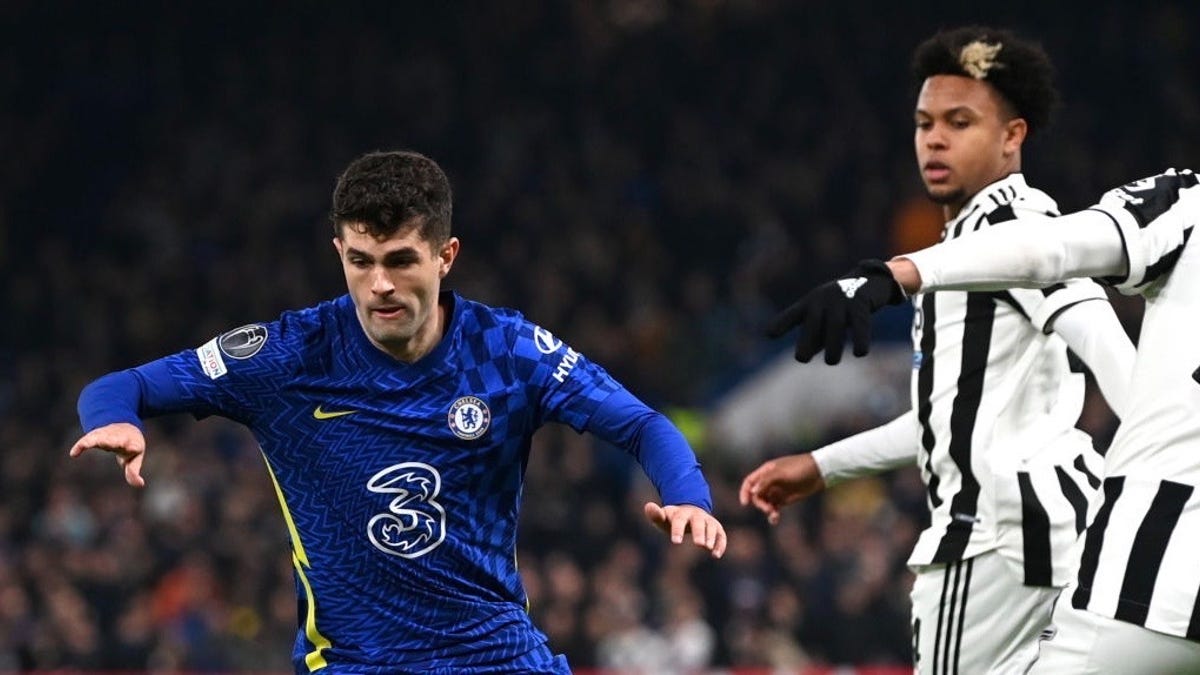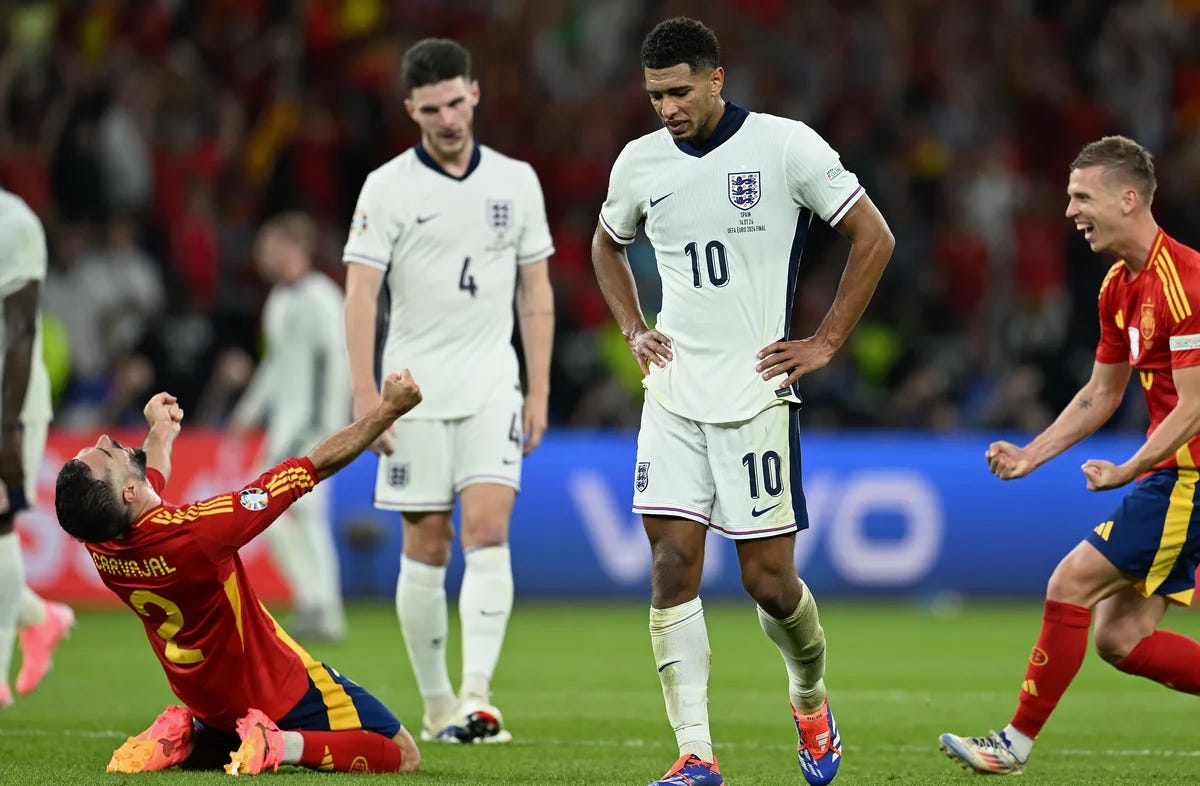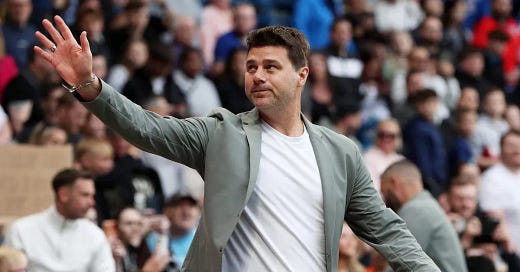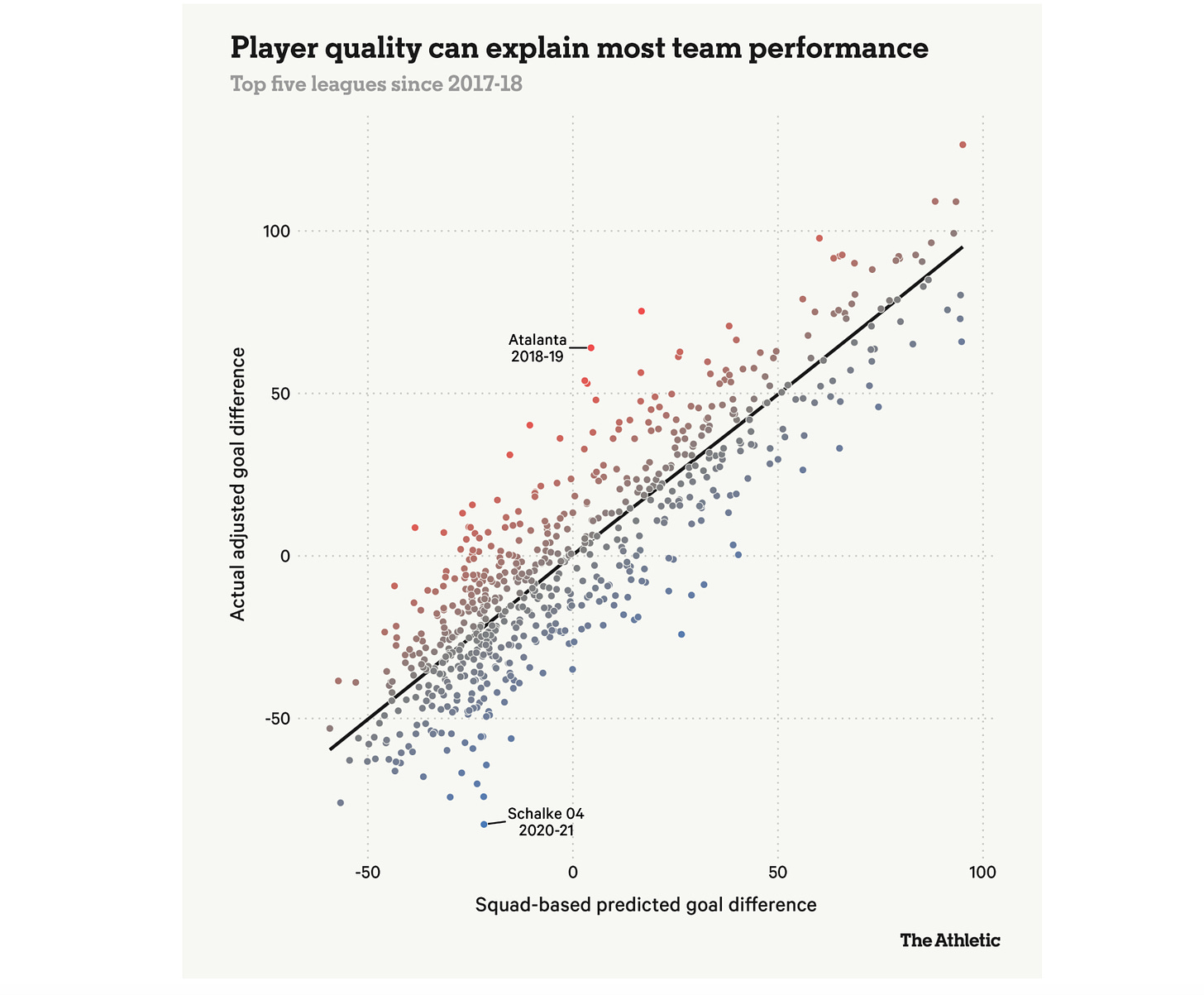Great Expectations: Pochettino’s Mission Impossible
On U.S. ambitions, U.S. reality, and why no manager can bring them together
Ahead of the 2026 World Cup on American soil, the U.S. chose Mauricio Pochettino as its next manager.
Pochettino began his playing career in the same team as Diego Maradona. He would go on to play for Paris Saint-Germain and the Argentinian national team. Following his playing days, he managed Tottenham to a Champions League final and coached Messi, Neymar, and Mbappé back at PSG before taking another top job at Chelsea. He employs an attacking, high-pressing style that U.S. fans have craved since Bielsa’s Leeds and Klopp’s Liverpool began putting it on our American TVs, and a knack for developing young stars like Harry Kane, Heung-Min Son, and Cole Palmer.
All that is to say that Pochettino is exactly the coach that the U.S. has been looking for: one with the credentials and the wisdom necessary to help the U.S. finally achieve global soccer relevance - a feat his predecessor, Gregg Berhalter, with his MLS background and American passport, could not have hoped to produce.
But entering the Pochettino era of the U.S. men’s national team, I’m left wondering if the task he’s been given - to finally translate America’s ambitions to international success - is one that may be too great for any manager to handle.
The U.S. Reality
Underpinning the idea that Pochettino will get more out of the USMNT is the notion that Berhalter was holding this team back. But while Berhalter’s results may not have lived up to U.S. expectations, they might have been right in line with U.S. talent.
Coinciding with Gregg Berhalter’s hiring in 2018 was the beginning of a mass migration of American players to Europe’s top five leagues (England, Spain, Germany, Italy, France). These transfers, previously reserved for the USMNT’s best players, like Landon Donovan or Tim Howard, led US fans to declare the beginning of a “Golden Generation.” On June 8th, 2024, the U.S. even fielded an entire starting eleven of players in Europe’s top competitions - a milestone that told Americans they were (literally) playing in the big leagues now.

But while this may be a golden generation for the U.S., we don’t yet have the gold standard of talent worldwide. A recent article for The Athletic found that the U.S. had ten players playing at the world’s top 50 clubs. That’s more than we’ve had in the past, but only around half as many as the elite soccer-playing countries like Argentina, Spain, France, and England, and also fewer than countries like Turkey (16), Denmark (12), and Poland (11). That same article also cites the results of a player evaluation model1 that ranked the U.S.’s talent 13th at the Euros and Copa America - behind Brazil, Argentina, Colombia, and Uruguay, and all eight of the Euros quarterfinalists.2
That evaluation of the team makes the U.S. results under Berhalter seem less disappointing and more appropriate. In the 2022 World Cup, the U.S. was easily dispatched in the round of 16 by the Netherlands (ranked 8th by FIFA). The USMNT’s 2024 Copa America group stage exit was an underachievement, but even if the U.S. had navigated the group as expected, a Colombia team (Ranked 12th by FIFA) that had beaten them 5-1 two weeks before was waiting in the quarterfinals. The U.S. was dominant against the lighter-weight CONCACAF under Berhalter, winning three consecutive Nations League titles, but the highest-ranked team that the U.S. beat outside of CONCACAF in the Berhalter era was Iran (Ranked 20th by FIFA). These results may not meet U.S. expectations, but they do meet those of the world’s 13th-best team.
The Great Man(ager) of History (Myth)
Perhaps you would argue that this is exactly why the U.S. hired Pochettino. If Gregg Berhalter could get the world’s 13th-best results out of the world’s 13th-best team, a better manager like Pochettino should be able to get more from the same players. And yet, the theory of the value-adding manager is one that has been debunked. In a piece evaluating the impact of managers at top European clubs,
shows that a team’s success can be almost entirely predicted by their wages - the most direct reflection of their quality. Muller also found that managers who outperformed their team’s wages one season weren’t any more likely to do it again the following season. In the long run, Muller argues, better players generate better results, regardless of who is managing them.Why do managers have such little long-run impact on team results? Some argue that the game is just too random, leading to too many unique situations for anyone to prescribe very impactful instructions3. Another theory, which I find more compelling, is that the managers getting high-profile jobs are all making large, but fairly equal, contributions to their teams, perhaps approaching the limit to the impact a coach can make. So while they are important, they don’t generate many wins relative to the other managers they’re competing against.
In the long run, the net impact of top managers may be more aesthetic than anything. A useful analogy is to compare managers to chefs4: they all have unique styles that change how the food tastes, but in the end, they can only serve you some combination of the ingredients on hand. Guardiola is in starched whites, moving the intricate passing patterns from Rodri and Foden around with tweezers to craft a 12-course tasting menu. Jürgen Klopp has AC/DC blaring as he turns out burgers and barbecue à la Trent Alexander-Arnold diagonals to Mohamed Salah. Carlo Ancelotti is running a farm-to-table affair, suggesting your table order the Chianti to complement the brilliance of Vinicius Junior and Mbappé.
Maybe you think Berhalter was serving us fast food, and Pochettino is going to turn the USMNT into a classy steakhouse, but either way, it will still be 100% American beef coming out of the kitchen. It’s going to feel different, and the complexion of week-to-week results might change - Berhalter’s style encouraged low-variance, consistent performance, while Pochettino has a history of generating more exciting but more variable results - but in the long run, the U.S. results are going to reflect U.S. talent, and swapping Berhalter for Pochettino isn’t going to change that. The trouble for Pochettino, however, is that while the U.S. reality will stay the same, U.S. expectations certainly won’t.
The Tyranny of Expectations
We’ve established that U.S. results are aligned with U.S. talent, so where does our feeling of inadequacy around our national team come from? It isn’t the USMNT failing to fulfill its potential, but the USMNT's failure to fulfill U.S. fans’ expectations. The mismatch between our abilities and our ambitions perpetuates a vicious cycle, one where our national team chronically disappoints us, and we’re never truly satisfied.
If you watched the European Championships this summer, you’d have seen two severe cases of that cycle: the English and the French. These two teams actually have the talent that the U.S. is striving for, but with that talent just comes an adjustment in expectations. The fans of these countries now see failure as anything short of comfortably cruising to a Euro or World Cup - a feat that the small sample sizes, limited training time, and randomness of major international soccer make absurd. When you watch these teams play, you can see how the weight of their nation's expectations weigh on them, causing the best players in the world to play ultra-conservative, constipated soccer. It’s telling that Spain - relatively under the radar going into this Euros after a long period of disappointment relative to their own expectations - played so freely on the way to the championship.

The downside to the Pochettino hire is that it adds to expectations that were already beyond the USMNT. While there were valid on-field reasons to swap Berhalter for Pochettino, it was also a way of avoiding the discomfort of an honest self-assessment and allowing us to continue pursuing our deeply American narrative for the national team: That it is our inalienable right to speedily ascend to soccer’s elite. We’ve now been given more ammunition to pursue that narrative, with no change to the underlying talent that actually impacts our results. The result of the widening gap between expectations and reality could be that our new manager makes us feel even worse about the USMNT than we did before.
This isn’t a call for the U.S. fans to embrace soccer nihilism. Rather, it’s a call for us to take a clear-eyed inventory so that we can begin to appreciate where we are and eventually get where we’d like to go. Wishing that a new manager will make this team more than the sum of its parts is not constructive. By abandoning this hope that we’re already an England or France that hasn’t yet revealed itself, and instead accepting that we’re a team with improving, but middling talent, we can actually focus on being - and enjoying - the best version of that team. Rather than Spain and Argentina, we should have our sights set on Switzerland and Turkey - because if we can focus on being the team we ought to be, and beating the teams we ought to beat, then we can also make the improvements that we’re capable of making. We can do that with Pochettino, but only if we let ourselves get out of our own way. Perhaps one day, if U.S. talent continues to gain ground as it has the last few years, we’ll find that we do have the talent to compete with the world’s elite national teams. But whether we can enjoy that day when it comes will still be a question of bringing our expectations in line with our reality, just a different one.
I even think Gregg Berhalter might have understood his team's limitations, and perhaps the limits to how happy he could ever make U.S. fans. In his “10 Things I Can’t Live Without” interview with GQ, I watched Berhalter introduce a beautiful, rippled Japanese Shun knife. Smiling, he looks right into the camera and says, “This isn’t just a knife; it’s a really good knife, [and] any job is about the type of equipment you have.”
You did the job you could with what you had, Gregg. It was just never going to satisfy us, and I’m not sure anything Pochettino cooks up can, either.
Edited excellently by Greta Gruber
The model from Twenty First Group, a sports-data consulting firm, “[G]enerates ratings for more than 145,000 players worldwide, using factors such as the strength of a player’s team, their position, their playing time, and their contribution to the team’s attack or defense.”
The US may actually rank lower than 13th, however the data from The Athletic only includes the quarterfinalist from the Euros, and is therefore missing round-of-16 or group stage exits who could sit above the U.S.
In my last piece - I touched on how Pep Guardiola’s career has been spent fighting this idea that the game is dominated by randomness. Check that piece out here.
The first person I’ve seen to write about this was
who writes the excellent Distance Covered publication here on Substack. In the piece where he does it, however, Williams uses the analogy to argue that England Manager Gareth Southgate was holding back his England team, a different point than I make here.






Yup pretty much. I'd be careful applying stuff about the impact of club managers to the international game, because they're fundamentally different jobs: you get less time to coach but have more control over your squad. If Poch is going to make a difference before the next World Cup, I think it'll come from using his international profile to continue Berhalter's success at recruiting dual nats — ordering new knives instead of sharpening what he's got.
Great Analysis Alex- I can’t argue with the stats even though I want to believe Pochettino will make a dramatic difference for USMNT.
I think the Berhalter era (pt. 2) was especially difficult because it seemed like the team’s focus was on NOT losing rather than aggressively/creatively producing scoring opportunities. For a country that embraces the risk taker (Hail Mary passes, deep 3 point shots), it’s hard to defend a conservative approach that doesn’t yield results.